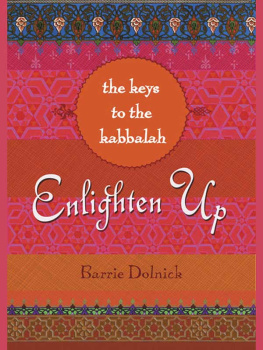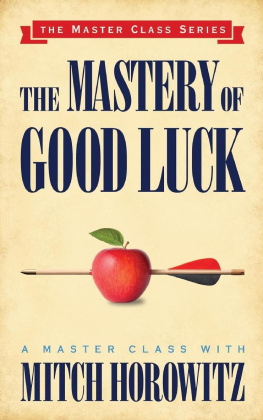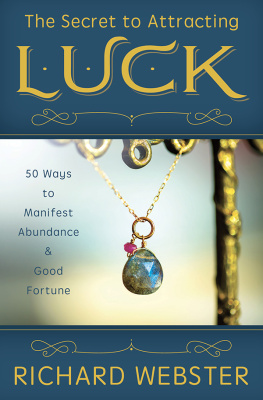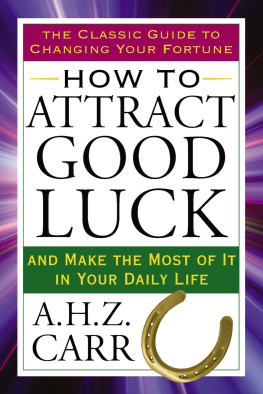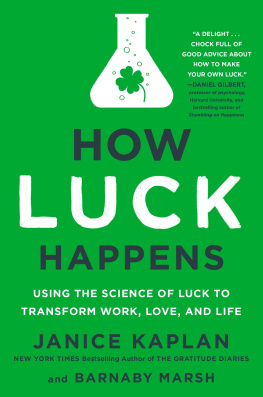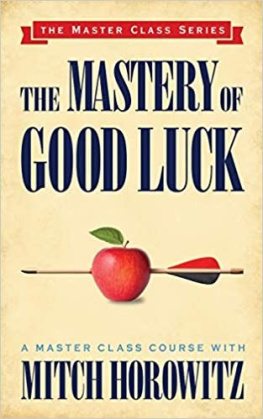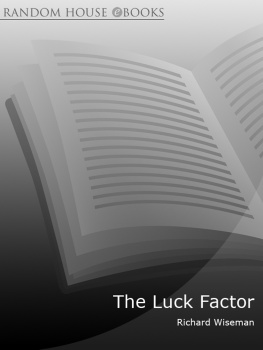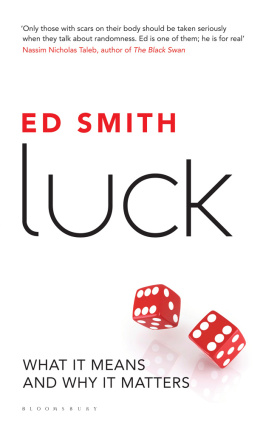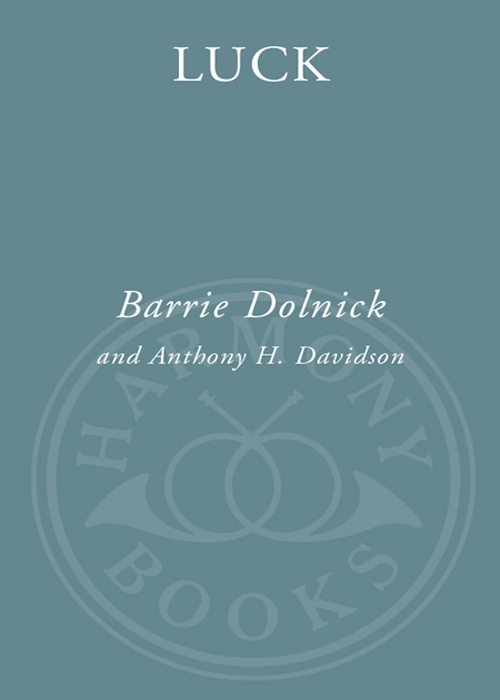
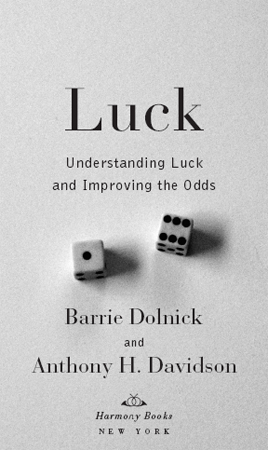
Contents
This book is dedicated to our families and to anyone
who has ever given someone a lucky break
Acknowledgments
I wish to thank my coauthor, Barrie Dolnick, who saw the potential in this idea and helped make it happen. I am grateful to my wife, Sheila, and my sons, Andrew and Patrick, for being tolerant and supportive of a new creative process. I also thank my family, Dad (Phil), Mom (Pat), Barb, Merry and Charlie, Tom and Joan, Wendy and Todd, and Phil and Lindsay, for keeping our family luck flowing. Thanks to Alan Nevins for his help and Shaye Areheart for her expertise. And to luck, which comes in many forms, in many ways, in all our lives.
A.D.
Deepest gratitude is due to Tony Davidson for his persistence, his vision, and his intellectual contributionsthis was his idea. I am so grateful as always to Gero and Elisabeth for their understanding and respect while I write; to my mom and sisters, who keep me laughing; and to my friends Cheryl, Christine, Joelle, and Sheila, who celebrate luck in all its forms. I am also particularly grateful to Sabrina Diano for her friendship and help in translation, and to Professor Kathryn Shanley, who brought medicine into my life. Thanks to Alan Nevins and his sharp eye for the right track and to Shaye Areheart, who is more than an editorshes a true friend.
B.D.
Preface
What happens when you ask someone for a concrete opinion about the existence of or belief in luck? We asked ourselves that question.
Luck is a vast subject that is extremely personal. Its like God or the existence of a soul: You believe in it, maybe you toy with believing in it, or you just dismiss it as unworthy of your time. It can evoke a broad spectrum of feelings, ranging from enthusiasm (generally from those who feel lucky) to annoyance and frustration. No one can deny that there are situations in which luck plays a big role. No one can avoid using the word luck in everyday language. It seems to be as embedded in our lives as breathing.
So why do we want to write about luck? We have several motivations. We want to examine luck in its historical context. We want to see if it is possible to understand it better. We want to use it in our lives. We want to form an opinion about luck that we can share with you.
We are interested in exploring luck on behalf of the public. Luck is courted openly by millions of people who play lotteries and go to casinos. Luck is silently wished for and prayed for when business deals are proposed, ball games are played, and parking spaces are sought. We talk about luck all the time. We wish it for our friends and neighbors and certainly hope to capture some for ourselves.
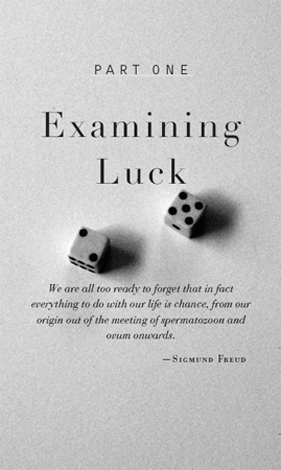
Chapter 1
Luck Begins
Y ou very likely utter this word at least once a day without even thinking about it. Luck.
Byeand good luck, you say, ending a phone call.
I got lucky, you think when you snag a great parking space.
Shes so lucky, you think when you hear about a friend who got a better job.
You live with luck as your silent companion for your whole life. Most of the time, you probably dont even pay attention to it. Chances are, you really think about luck only when you buy a lottery ticket or participate in a contest.
Luck is so much more than that.
Superstition? Luck? Whats the Difference?
The interweaving themes of luck and superstition are so knotted over time that its almost impossible to separate them. Yet we want you to notice a slight difference.
According to Dictionary.com, luck (as a noun) is:
THE FORCE THAT SEEMS TO OPERATE FOR GOOD OR ILL IN A PERSONS LIFE, AS IN SHAPING CIRCUMSTANCES, EVENTS, OR OPPORTUNITIES.
Superstition is:
A BELIEF OR NOTION, NOT BASED ON REASON OR KNOWLEDGE, IN OR OF THE OMINOUS SIGNIFICANCE OF A PARTICULAR THING, CIRCUMSTANCE, OCCURRENCE, PROCEEDING, OR THE LIKE.
Luck is defined as a force that tips the balance in life. Superstition is merely a belief or idea based on nothing to alleviate fear or harm. Forget superstitionlets study luck and see if this force can be understood.
For our purposes, we define luck as winning in the short term or being successful in the long term owing to chance.
Does Luck Exist?
From the philosophical perspective, luck exists because often we lack complete information and perfect predictive powers. If an event is uncertain and the result is positive, it can be attributed to good luck.
Is Luck a Force of Nature?
We think so. It is certainly a part of human nature. The belief in luck is somewhat similar to the belief in God. It takes faith that it exists.
Weve seen luck appear in the most unusual circumstances. It intervenes, like grace, in situations where even hope is fading. What differs is that luck can appear even when you dont need it. Luck is just one of those things in life that you either acknowledge and work with or ignore and deny. It is there whatever you do.
We have written this book to reacquaint you with the concept of luck and to help you develop a relationship with it. What is luck? Why is it sometimes defined through a horseshoe or a four-leaf clover? Whats been lucky in the past, and what might be lucky in the future? Are some people born lucky? Can you improve your own luck?
The history of luck is extensive and fascinating. The belief in luck began with the most ancient culturesas early as cavemen. We have found that our ancestors studied the subject carefully, and much of what they found and believed survives today.
Is luck something we can understand? Is it just superstitious to assume we can attract luck? Weve examined the issue from many angles, and weve come to believe that although you cant control luck, you can certainly understand it and explore your relationship with luck effectively. We believe that there are luckier times in our lives and that its possible to forecast when luck will be with us. We also think that knowing when your luck is out is even more interestingthose are the walk away and dont take risks periods when you dont have luck working for you.
How people see luck these days is varied and personal. Yet no one, not even the most hard-core rationalist, is immune from using the word luck or judging something or someone to be lucky. Luck is embedded in our consciousness, if not our DNA.
Where do you start with luck? Its tough to approach such a huge topic. To get an idea of how the concept of luck takes root in society, we thought wed just look around. In the short history of the United States, it is fascinating to see how luck worked its way through the melting pot. Our brief survey of luck in America provides a fast-forwarded summary of how luck is seen through the eyes of different people.
The history of luck itself is also curious. Since the belief in luck seems as ancient as humans, we went back in time as far as we could. We found that luck originates with nature itself. Abundance, prosperity, health, triumphthese were and still are the needs, wants, and wishes of all men and women. But the natural world was chaotic and unpredictable, which is precisely why the ancients studied it for its links and clues to luck and good fortune. To understand nature was to interpret its signs. Good luck is grounded in the natural world, and we examine some ancient luck symbols that are still found today.
Next page

